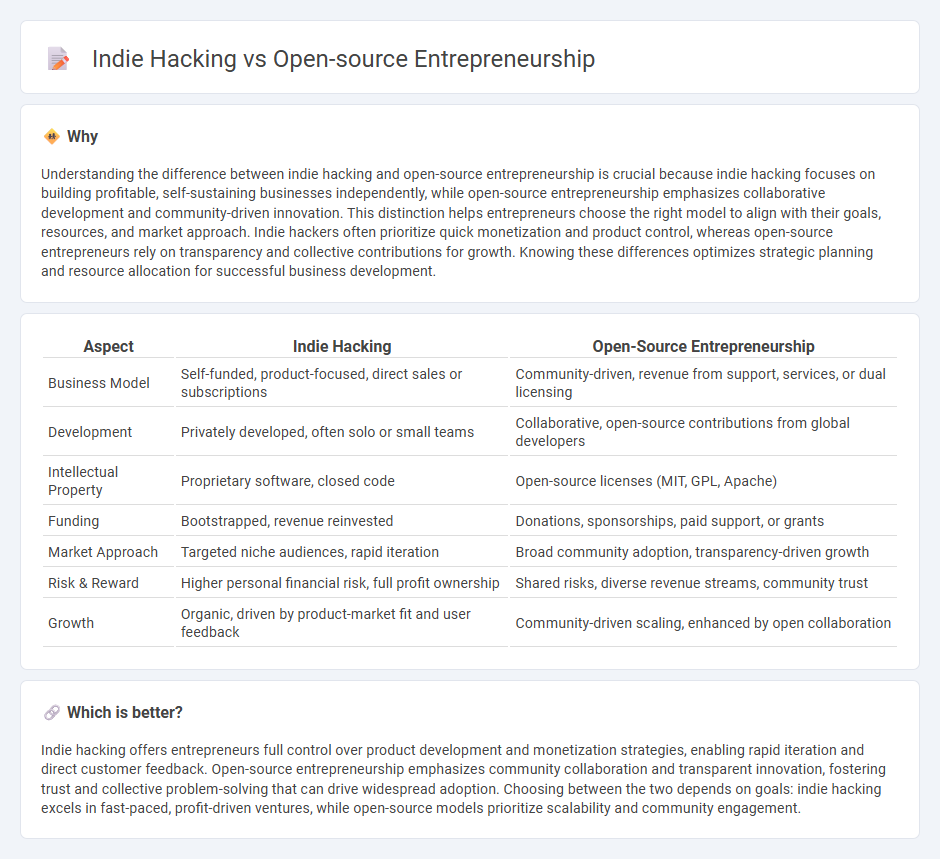
Indie hacking emphasizes building and scaling small, self-sustained startups, focusing on quick product iterations and direct customer feedback, while open-source entrepreneurship centers on collaborative software development with community contributions and transparent innovation. Both approaches promote autonomy and creativity but differ in ownership models and monetization strategies. Explore the nuances between indie hacking and open-source entrepreneurship to determine the best path for your venture.
Why it is important
Understanding the difference between indie hacking and open-source entrepreneurship is crucial because indie hacking focuses on building profitable, self-sustaining businesses independently, while open-source entrepreneurship emphasizes collaborative development and community-driven innovation. This distinction helps entrepreneurs choose the right model to align with their goals, resources, and market approach. Indie hackers often prioritize quick monetization and product control, whereas open-source entrepreneurs rely on transparency and collective contributions for growth. Knowing these differences optimizes strategic planning and resource allocation for successful business development.
Comparison Table
| Aspect | Indie Hacking | Open-Source Entrepreneurship |
|---|---|---|
| Business Model | Self-funded, product-focused, direct sales or subscriptions | Community-driven, revenue from support, services, or dual licensing |
| Development | Privately developed, often solo or small teams | Collaborative, open-source contributions from global developers |
| Intellectual Property | Proprietary software, closed code | Open-source licenses (MIT, GPL, Apache) |
| Funding | Bootstrapped, revenue reinvested | Donations, sponsorships, paid support, or grants |
| Market Approach | Targeted niche audiences, rapid iteration | Broad community adoption, transparency-driven growth |
| Risk & Reward | Higher personal financial risk, full profit ownership | Shared risks, diverse revenue streams, community trust |
| Growth | Organic, driven by product-market fit and user feedback | Community-driven scaling, enhanced by open collaboration |
Which is better?
Indie hacking offers entrepreneurs full control over product development and monetization strategies, enabling rapid iteration and direct customer feedback. Open-source entrepreneurship emphasizes community collaboration and transparent innovation, fostering trust and collective problem-solving that can drive widespread adoption. Choosing between the two depends on goals: indie hacking excels in fast-paced, profit-driven ventures, while open-source models prioritize scalability and community engagement.
Connection
Indie hacking and open-source entrepreneurship intersect through shared values of independence, transparency, and community-driven innovation. Indie hackers often leverage open-source tools and frameworks to build scalable products while contributing back to the ecosystem. Open-source entrepreneurship accelerates product development by enabling collaboration and fostering trust among users and developers.
Key Terms
**Open-source entrepreneurship:**
Open-source entrepreneurship revolves around building scalable businesses by developing and monetizing open-source software projects, often leveraging community contributions and transparent development models. These entrepreneurs capitalize on recurring revenue streams through support services, customizations, and premium features while fostering collaboration and innovation. Explore how open-source entrepreneurship can transform your tech venture into a thriving ecosystem.
Community collaboration
Open-source entrepreneurship thrives on robust community collaboration, leveraging collective expertise to continuously improve projects and accelerate innovation. Indie hacking emphasizes solitary or small-team efforts, often focusing on self-sustained product development with limited community interaction. Explore how each approach uniquely harnesses community dynamics to fuel growth and success.
Transparency
Open-source entrepreneurship emphasizes collaborative innovation by openly sharing code and project developments, fostering community trust through total transparency. Indie hacking prioritizes rapid product iteration and personal autonomy, often maintaining selective disclosure to protect competitive advantage. Explore how transparency impacts strategic decisions and community engagement in both approaches.
Source and External Links
Open Source Software and Global Entrepreneurship - A 2023 study showing that increased country-level participation in open source software (OSS) leads to more new technology ventures, which tend to be higher quality and more globally mission-oriented, highlighting how OSS stimulates entrepreneurial growth especially when supported by human capital.
How Open Source Software Drives Entrepreneurial Activity - Research indicating that open source software participation correlates with a rise in new technology ventures globally, emphasizing that this effect is stronger in countries with greater income and human capital resources.
Business models for open-source software - An overview of various business models that open source software companies use to achieve profitability, including open core, dual licensing, software as a service, freemium, donation-based funding, crowdfunding, and crowdsourcing.
 dowidth.com
dowidth.com